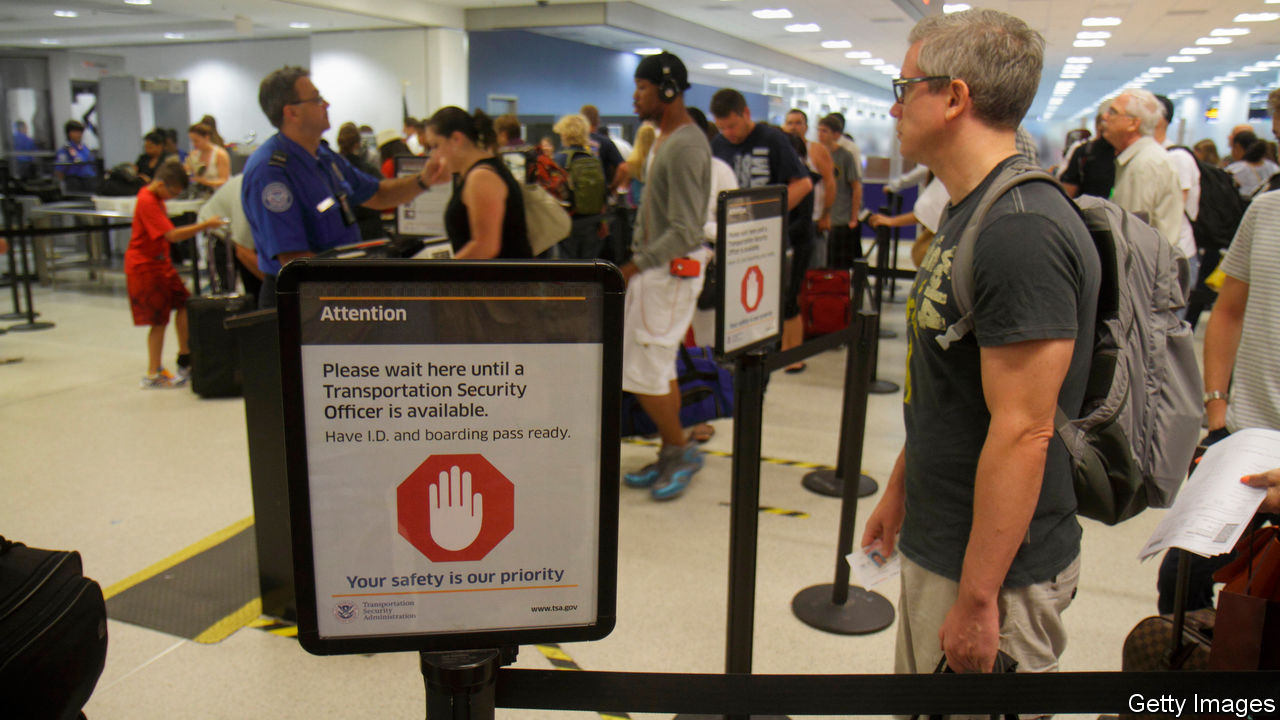
ARE you on America’s newest airport-security watch list? You could be, but you would never know. That is because the list is secret, and no one quite understands what it takes to land on it. News of the list emerged earlier this month, when the New York Times obtained a five-page internal directive from the Transportation Security Administration (TSA), the government agency that oversees airport security in America. It revealed that the TSA could place flyers on the watch list, which it created in February, if they engaged in behaviour that the agency found problematic. That includes violent altercations with TSA agents. But, more problematically, it appears to extend well beyond physical assaults.
“An intent to injure or cause physical pain is not required, nor is an actual physical injury,” the memo states. People can be placed on the list for loitering suspiciously around checkpoints or posing “challenges to the safe and effective completion of screening.” Flyers cannot check whether they are on the list, nor does there appear to be any way for them to appeal when they are placed on it. All of this ambiguity is hard enough for American flyers, but it could be truly confounding for business travellers visiting the country, argues Greeley Koch, executive director of the Association of Corporate Travel Executives, a trade group. It is especially problematic “for someone from outside America that isn’t used to the TSA and how there’s no uniformity in how they treat passengers,” Mr Koch says. “If you’re a business traveller and you’re coming in and then all of a sudden subject to a pat-down search—if you make a bad comment, does that put you on this listing?”
-
America’s security profiling at airports should worry frequent flyers
-
Money Talks: The Italian problem, and more
-
Nick Clegg on political anger and the need to be a patriotic liberal
-
Why Northern Ireland has such restrictive abortion laws
-
Italy’s bond yields rise as it heads for another election
-
American firms reveal the gulf between bosses’ and workers’ pay
If the criteria for being placed on the list are not exactly clear, the consequences of being on it are even less so. According to the memo, travellers cannot be prevented from boarding flights solely because they are on the list, nor can they be subjected to extra security procedures. The TSA uses its better-known database of known or suspected terrorists, which contains more than a million names, to populate the 47,000 names on the no-fly list. But the purpose of this new list remains murky, leaving some civil-liberties advocates to argue that it places unwitting travellers into a federal database without accomplishing any real ends.
“It permits TSA officials to blacklist people for conduct that could be wholly innocuous,” Hugh Handeyside, an attorney with the American Civil Liberties Union, an advocacy group, told the Washington Post. “This is conduct that’s so completely subjective, and in many cases likely completely innocent.”
A TSA official told the New York Times that the agency’s security screeners were assaulted 26 times in 2016 and 34 times last year. That suggests either that the secret watch list is very small or, more likely, that it includes more than just people who have assaulted TSA officers. Two government security officials told the newspaper that the list contains more than just the approximately 50 people that the TSA official said were on it.
Mr Koch says it is not fair for the TSA to place people on the list for being confrontational, when its officers are often rude and provoke this type of behaviour when passengers are under stress to catch their flights on time. And for business travellers, he says, the fear of being on the list can compound this pressure. “Does that mean that you’re going to be subject to additional searches on that trip or future trips?” he asks. “And will that cause missed connections?” He also has one more fear: “If I talk to you and I get quoted, does that mean I’ll get on the list for being insubordinate to the TSA?” Almost certainly not, one hopes. But given the secretive nature of the list, we cannot know for sure.
Source: economist
America’s security profiling at airports should worry frequent flyers